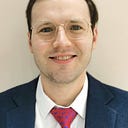The Importance of Asking Questions
A physician scientist’s perspective on the importance of being curious.
There are several experiences that I still carry with me from medical school. Some are happy, some are sad, and others traumatic. One experience that I remember from early in my clinical rotations was being told by someone in a mentor role that one of my questions was terrible. As a learner, this was understandably a hard thing to hear, especially from one who got to where he was through his curiosity.
I was a poorly-achieving student up until mid-high-school. As a teenager, I went through the age-group-implicit strife, which was complicated by a disability. This was understandably not good for my GPA. When I was finally able to come to peace with my life, the question of what I was capable of became pressing, given how little I thought of myself before then. This motivated me to push myself, and I was fortunate to have some positive results.
I am not going to proceed into a tale of what I was able to accomplish despite adversity. My story is less important than what helped carry me through my journey: a desire to understand the world. I have always been curious about how things worked. Growing up, I did my share of taking apart things and seeing what I could build myself. Even in my darker teenage years, my creativity persevered. As I became more interested in academics, I learned to enjoy studying the world in a more structured capacity. It was remarkable to understand the basic building blocks of a cell and then pair that with knowledge from chemistry about how pieces came together to form a whole. It was only natural that I gravitated towards research since it was pretty much getting to do what I enjoy for a career.
Exploring the unknown defines research. Whenever you are working, it is like you are an adventurer. You study what no one else has ever looked into before, and it is thrilling. Success in this realm is all about asking the right questions, and eventually, you produce something cohesive from what was previously disorganized. Naturally, asking the right questions is something that developed over time.
As I found in medical school, this curiosity helped me learn because it motivated me to understand topics holistically, which is required to approach clinical questions. Knowing why specific symptoms are associated with a given condition guides better clinical practice than memorizing some symptoms and being lost when, as usual, common conditions present uncommonly. Curiosity is understandably limited to a degree in medical practice. Modern medicine is appropriately structured towards giving the best treatments. Experimenting is only ethical if there is evidence for a proposed path or you have an approved research protocol.
Such an approach can make one forget how medical practice is at its core founded on curiosity. The marvels of modern medicine and science were only made possible by individuals asking whether things could be different, such as reducing the number of people who die from heart attacks. While there is a degree of required simplicity where you must treat this condition with that therapy, you have to ask the right questions to determine what condition is present in the first place. While clinical “buzzwords” are encouraged to be memorized for board preparation, more likely than not, the reality of a patient’s suffering will not fit into a nice little box. You have to ask questions and be curious about someone’s situation to put their puzzle together and help them.
It is disheartening for a learner to be told to ask questions and the cliche “there are no stupid questions” and then be told their cognitive processing is defective. For one with a disability, such an assertion of defectiveness goes deeper considering the difficulty of grappling with conditions that can make you feel lesser than others and “defective” in a way. True, some questions are better than others. Learning to ask such questions is a process and something that develops over time. While we cannot control how others respond to our developing selves and curiosity, we can choose what to make of situations. I decided to reflect and remind myself what is essential for my personal growth. Later in medical school and into my Ph.D., it paid off.
